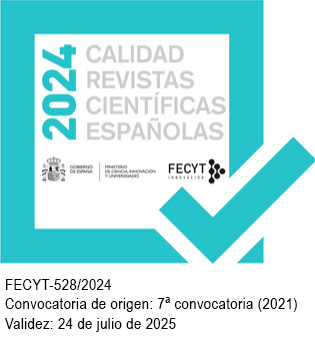Generativism and Minimimalism: Which is the the theory and which is the Program?
https://doi.org/10.31810/rsel.52.2.1
Keywords:
Generative grammar; minimalist program; biolinguistic program; grammatical theoryAbstract
Chomsky and his followers routinely introduce linguistic minimalism as a «program», in the sense that it merely provides some guidelines for the elaboration of grammatical theories proper. According to this orthodox interpretation, these theories can be attributed factual content, that is, content open to empirical refutation, but the program as such is immune to this type of rebuttal. This article discusses this vision of the minimalist «program» and proposes a reconceptualization of both minimalism and generativism in its different phases of development. According to this proposal,
Downloads
References
Balari, S., Lorenzo, G. y Sultan, S. (2020). Language acquisition and eco-devo processes: The case of the lexicon-syntax interface. Biological Theory 15, 148-160. doi: https://doi.org/10.1007/s13752-020-00352-9
Behme, C. (2015). Is the ontology of biolinguistics coherent? Language Sciences 47, 32-42. doi: https://doi.org/10.1016/j.langsci.2014.07.012
Berwick, R. C., y Chomsky, N. (2011). The biolinguistics program: the current state of its development, en A.M. di Sciullo y C. Boeckx (Eds.), The biolinguistic enterprise. New perspectives on the evolution and nature of the human language faculty (pp. 19-41), Oxford: Oxford University Press.
Berwick, R. C., y Chomsky, N. (2016). Why only us. Language and evolution. Cambridge, MA: MIT Press.
Berwick, R. C., Friederici, A. D., Chomsky, N. y Bolhuis, J. J. (2013). Evolution, brain, and the nature of language. Trends in Cognitive Science 17, 89–98. doi: https://doi.org/10.1016/j.tics.2012.12.002
Berwick, R. C., Pietroski, P., Yankama, B. y Chomsky, N. (2011). Poverty of stimulus revisited. Cognitive Science. A Multidisciplinary Journal 35(7), 1207-1242. doi: https://doi.org/10.1111/j.1551-6709.2011.01189.x
Boeckx, C. (2015). Un-Cartesian (bio-)linguistics. Teorema 34(1), 161-186. https://www.jstor.org/stable/i40148914
Boeckx, C. y Uriagereka, J. (2007). Minimalism, en G. Ramchand y Ch. Reiss (Eds.), The Oxford handbook of linguistic interfaces (pp. 541-573), Oxford: Oxford University Press.
Chomsky, N. (1955/75). The logical structure of linguistic theory. Nueva York: Plenum.
Chomsky, N. (1965). Aspects of the theory of syntax. Cambridge, MA: MIT Press (citado por la traducción de Carlos-Peregrín Otero. 1999. Aspectos de la teoría de la sintaxis. Barcelona: Gedisa).
Chomsky, N. (1966). Cartesian linguistics. A chapter in the history of rationalist thought. Nueva York: Harper & Row (citado por la traducción de Enrique Wulf. 1969. Lingüística cartesiana. Un capítulo de la historia del pensamiento racionalista. Madrid: Gredos).
Chomsky, N. (1968). Quine’s empirical assumptions. Synthese 19(1/2), 53-68. https://www.jstor.org/stable/20114630
Chomsky, N. (1970). Remarks on nominalization, en R. Jabobs y P. Rosenbaum (Eds.), Readings in English transformational grammar (pp.184-221), Waltham, MA: Ginn and Co.
Chomsky, N. (1972). Some empirical issues in the theory of transformational grammar, en Studies on semantics in generative grammar (pp. 120-202), La Haya: Mouton.
Chomsky, N. (1973). Conditions on transformations, en S.R. Anderson y P. Kiparsky (Eds.), A Festschrift for Morris Halle (pp. 232-286), Nueva York: Holt, Rinehart & Winston.
Chomsky, N. (1975). Reflections on language. Nueva York: Pantheon (citado por la traducción de Joan A. Argente y Josep M. Nadal. 1979. Reflexiones sobre el lenguaje. Bareclona: Ariel).
Chomsky, N. (1980). Rules and representations. Nueva York: Columbia University Press.
Chomsky, N. (1981). Lectures on government and binding. Dordrecht: Foris.
Chomsky, N. (1991). Some notes on economy of derivation and representation, en R. Freidin (Ed.), Principles and parameters in comparative grammar (pp. 415-454), Cambridge, MA: MIT Press (citado por la traducción de Juan Romero. 1999. Algunas notas sobre la economía de la derivación y la representación, en N. Chomsky, El programa minimalista (pp. 23-79), Madrid: Alianza).
Chomsky, N. (1993). A minimalist program for linguistic theory, en K. Hale y S. J. Keyser (Eds.), The view from Building 20. Essays in linguistics in honor of Sylvain Bromberger (pp. 1-52), Cambridge, MA: MIT Press (citado por la traducción de Juan Romero. 1999. Un programa minimalista para la teoría lingüística, en N. Chomsky, El programa minimalista (pp. 81-152), Madrid: Alianza).
Chomsky, N. (2000). Minimalist inquiries: the framework, en R. Martin, D. Michaels y J. Uriagereka (Eds.), Step by step. Papers in minimalist syntax in honor of Howard Lasnik (pp. 89-155), Cambridge, MA: MIT Press (citado por la traducción de Víctor M. Longa. 1999. Indagaciones minimalistas: el marco. Moenia 5, 69-126).
Chomsky, N. (2004). Beyond explanatory adequacy, en A. Belletti (Ed.), Structures and beyond. Volume 3: The cartography of syntactic structures (pp. 104-131), Oxford: Oxford University Press.
Chomsky, N. (2005). Three factors in language design. Linguistic Inquiry 36(1), 1-22. doi: https://doi.org/10.1162/0024389052993655
Chomsky, N. (2007). Approaching UG from below, en U. Sauerland y H.-M. Gärtner, (Eds.), Interfaces + recursion = language? Chomsky’s minimalism and the view from syntax-semantics (pp. 1-30), Berlín: De Gruyter Mouton.
Chomsky, N. (2013). Problems of projection. Lingua 130, 33-49. doi: https://doi.org/10.1016/j.lingua.2012.12.003
Chomsky, N. (2016). What kind of creatures are we? Nueva York: Columbia University Press.
Chomsky, N. (2019). Some puzzling foundational issues: The Reading program. Catalan Journal of Linguistics, Special Issue, 263-285. doi: http://doi.org/10.5565/rev/catjl.287
Christiansen, M. y Chater, N. (2016). Creating language. Integrating development, acquisition, and processing. Cambridge; MA: MIT Press.
Deacon, T. W. (1997). The symbolic species. The co-evolution of language and the brain. Nueva York: W.W. Norton.
Eguren, L. y Fernández Soriano, O. (2004). Introducción a una sintaxis minimista. Madrid: Gredos.
Fodor, J. A. (1975). The language of thought. Cambridge, MA: Harvard University Press.
Fodor, J. A. (1980). The modularity of mind. Cambridge, MA: MIT Press.
Fodor, J. A. (2000). The mind doesn’t work that way. The scope and limits of computational psychology. Cambridge, MA: MIT Press.
Gallego, Á. J. (2022). Manual de sintaxis minimista. Madrid: Akal.
Grimshaw, J. (1990). Argument structure. Cambridge, MA: MIT Press.
Hale, K. y Keyser, S. J. (2002). Prolegomenon to a theory of argument structure. Cambridge, MA: MIT Press.
Hinzen, W. (2014). What is un-Cartesian linguistics? Biolinguistics 8, 226-257. https://www.biolinguistics.eu/index.php/biolinguistics/article/view/323
Hornstein, N., Nunes, J. y Grohmann, K. K. (2005). Understanding minimalism. Cambridge: Cambridge University Press.
Huang, Ch.-T. J. (1982). Logical relations in Chinese and the theory of grammar. Tesis Doctoral, MIT.
Jackendoff, R. (1977). X’ syntax. A study of phrase structure. Cambridge, MA: MIT Press.
Kuhn, T.S. (1962). The structure of scientific revolutions. Chicago: University of Chicago Press.
Lakatos, I. (1978). The methodology of scientific research programs. Philosophical papers. Volume I. Cambridge: Cambridge University Press (citado por la traducción de Juan Carlos Zapatero. 1983. La metodología de los programas de investigación científica. Madrid: Alianza).
Lappin, S., Levine D. y Johnson, D.E. (2000). The structure of unscientific revolutions. Natural Language & Linguistic Theory 18(3), 665-671. doi: https://doi.org/10.1023/A:1006474128258
Lohndal, T. y Uriagereka, J. (2017). Third factor explanations and Universal Grammar, en I. Roberts (Ed.), The Oxford handbook of Universal Grammar (pp. 114-128), Oxford: Oxford University Press.
Longa, V. M. y Lorenzo, G. (2008). What about a (really) minimalist theory of language acquisition? Linguistics 46(3), 541-570. doi: https://doi.org/10.1515/LING.2008.018
Longa, V. M. y Lorenzo, G. (2012). ¿Reduce, complete o elimina? Sobre el estatus del Programa Minimalista en la gramática generativa. Revista Española de Lingüística 42(1), 145-174. http://revista.sel.edu.es/index.php/revista/article/view/12
Lorenzo, G. (2016). What is it like to be a human being? Language design and its implications for the «human nature» debate. Teorema 35(3), 219-232. https://www.jstor.org/stable/44077420
Martin, R. y Uriagereka, J. (2000). Some possible foundations of the Minimalist Program, en R. Martin, D. Michaels y J. Urigereka (Eds.), Step by step. Papers in minimalist syntax in honor of Howard Lasnik (pp. 1-29), Cambridge, MA: MIT Press.
O’Grady, W. (2012). Three factors in the design and acquisition of language. WIREs Cognitive Science 3(5), 494-499. doi: https://doi.org/10.1002/wcs.1188
Postal, P. M. (2004). Skeptical linguistic essays. Oxford: Oxford University Press.
Quine, W. V. O. (1953). From a logical point of view. Cambridge, MA: Harvard University Press (citado por la traducción de Manuel Sacristán. 2002. Desde un punto de vista lógico. Barcelona: Gedisa).
Quine, W. V. O. (1975). Mind and verbal dispositions, en S. Guttenplan (Ed.), Mind and language (pp. 83-95). Oxford: Oxford University Press.
Reboul, A. (2017). Hinzen’s un-Cartesian linguistics. Theoretical Linguistics 43(3-4), 261-270. doi: https://doi.org/10.1515/tl-2017-0017
Rizzi, L. (2016). The concept of explanatory adequacy, en I. Roberts (Eds.), The Oxford handbook of Universal Grammar (pp. 97-113), Oxford: Oxford University Press.
Ross, J. (1967). Constraints on variables in syntax. Tesis Doctoral, MIT.
Thomas, M. (2020). On the reception and revivification of Cartesian linguistics, en É. Aussant y J.-M. Fortis (Eds.), History of linguistics 2007. Selected papers from the 14th International Conference on the History of the Language Sciences (ICHOLS 14), Paris, 28 August-1 September (pp. 157–169), Ámsterdam: John Benjamins.
Uriagereka, J. (1996). Formal and substantive elegance in the minimalist program, en Ch. Wilder, H.-M. Gärtner y M. Bierwisch (Eds.), The role of economy principles in linguistic theory (pp. 170-204), Berlín: Akademie Verlag.
Williams, E. (1994). Thematic structure in syntax. Cambridge, MA: MIT Press.
Published
How to Cite
Issue
Section
Copyright (c) 2022 Revista Española de Lingüística

This work is licensed under a Creative Commons Attribution-NonCommercial-NoDerivatives 4.0 International License.











